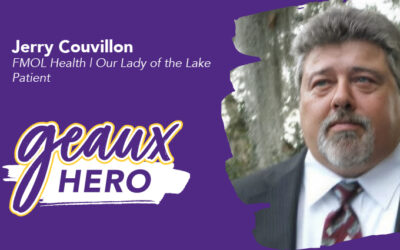Getting back to the basics of healthcare is all about focusing on the doctor-patient relationship — that precious time providers have to spend with their patients discussing what truly matters most to them.
“As providers, we’re all concerned with how to make the time you have with your patients the most meaningful,” says Theron McCormick, MD, allergist/immunologist with Our Lady of the Lake Children’s Health. “Having the support of an organization that provides the resources, teams and information so you can focus on putting your patients first — that’s how we do that meaningful work.”
Dr. McCormick is a member of Health Leaders Network, a physician-led collaboration of independent and employed providers who are committed to advancing the Triple Aim of value-based care:
- Improving health outcomes
- Improving the patient experience
- Controlling costs and unnecessary spending
HLN is a clinically integrated network and accountable care organization driven by three important principles that all factor into creating a more productive environment for providers and members.
1. Patients Do Best When Cared for by a Team that Works Together.
Many people who work in healthcare would agree that medicine has gotten compartmentalized. The new norm of virtual interactions has its benefits, but has also isolated healthcare teams, making collaboration harder.
“HLN has helped us reengage as a healthcare team and work closely together,” says Lauren Barfield, MD, internal medicine physician with Our Lady of the Lake Physician Group. “Providing the best possible care for patients goes way beyond what happens at in the exam room, and that means that every member of the team has to be meaningfully engaged — from the person answering the phones at the front desk to the home health partner who is checking on the patient after they go home from the hospital.”
The team approach is built into the HLN model, with the support of a dedicated team that can improve coordination and transitions between care settings as well as provide the resources a provider might need to make the quickest and most effective evidence-based care decisions.
HLN also allows independent physicians to maintain their private practice model while still tapping into the resources of the provider network and support team.
“If you want to practice and do it efficiently with better resources and data, you don’t want to be on another team because we have the best results,” says Christopher Thomas, MD, medical director of quality and patient safety for Franciscan Missionaries of Our Lady Health System.
That’s why more than 60 participating groups across Louisiana and Mississippi, including The Baton Rouge Clinic and Southwest Mississippi Regional Medical Center have all joined the network and utilized its resources.
It’s also why HLN scored within the top 5% of all accountable care organizations nationally in overall quality performance under the Medicare Shared Savings Program (MSSP) for 2022.
2. Actionable Data Helps Providers Continually Track and Improve Outcomes.
For providers, more tools at their disposal means more accountability and better care. HLN puts data to work in ways that translate directly to improvements in care and value.
“Value-based care requires us to be much more aggressive in performance improvement, quality and process,” Dr. Thomas says. “That requires a more aggressive analytics approach and much more rapid self-assessing.”
HLN has developed a platform that makes it easier for providers to reach new goals set by payors as part of the adoption of value-based models. The network also gives providers access to technology that can help them manage population health.
“We’re a lot more aware of the cost for patients now and can be smarter about our decisions,” Dr. McCormick says. “We’re able to say with confidence that this data has led me to this decision for the patient, and that it is safe and effective and also cost effective.”
This level of accountability means the right care at the right time for the patient, which gets to the heart of a provider’s mission in providing healthcare.
“This is helping us to be better stewards of our resources,” Dr. Barfield says. “We can shift them to where we need them the most.”
HLN is seeing success in a variety of patient health needs, such as more than 80% of hypertensive patients under control (140/90), which is up 10% since 2016. Also, 79% of eligible patients received colorectal cancer screenings in 2022, beating national and state averages of 71.6% and 72.6% respectively.
Overall, HLN reaches more than 260,000 covered lives spanning Louisiana and Mississippi.
3. Practicing Physicians Lead the Way and Govern the Success of the Network.
HLN was not developed by insurers or administrators, but by physicians who wanted to make sure providers and healthcare teams weren’t left out of the value-based care equation.
Physicians also lead the governance structure that keeps HLN excelling and improving on every measurement.
“When it comes to policymaking, your colleagues have sat on this committee and helped us create this winning strategy,” Dr. McCormick says.
HLN’s approach to value-based care is a return to evidence-based medical standards and supporting providers who utilize best practices to positively impact patients and their quality of life.
“It’s not about clicking a box anymore, it really is about improving the standard of care,” says Ashley Guy, MD, family medicine physician with Our Lady of Lourdes Physician Group. “There’s more attention to detail, there’s more accountability. As providers, we are challenging ourselves to meet our patients where they are.”




